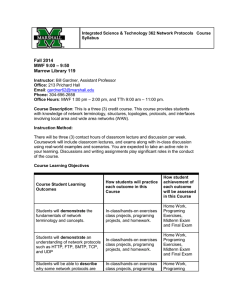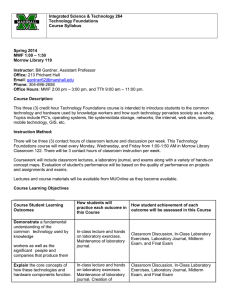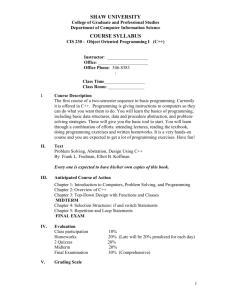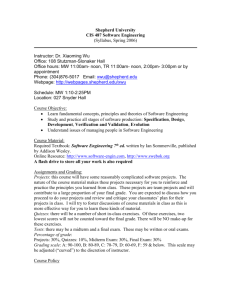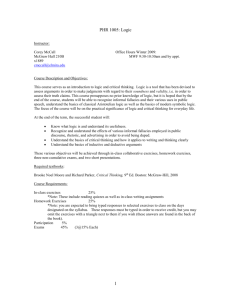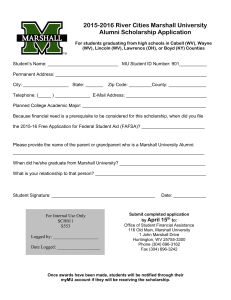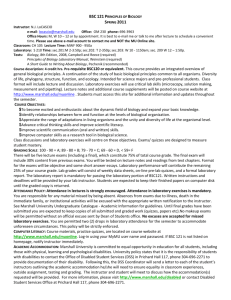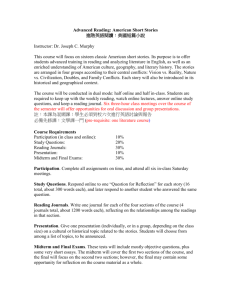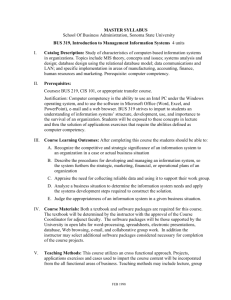Integrated Science & Technology 362 Network Protocols Course
advertisement
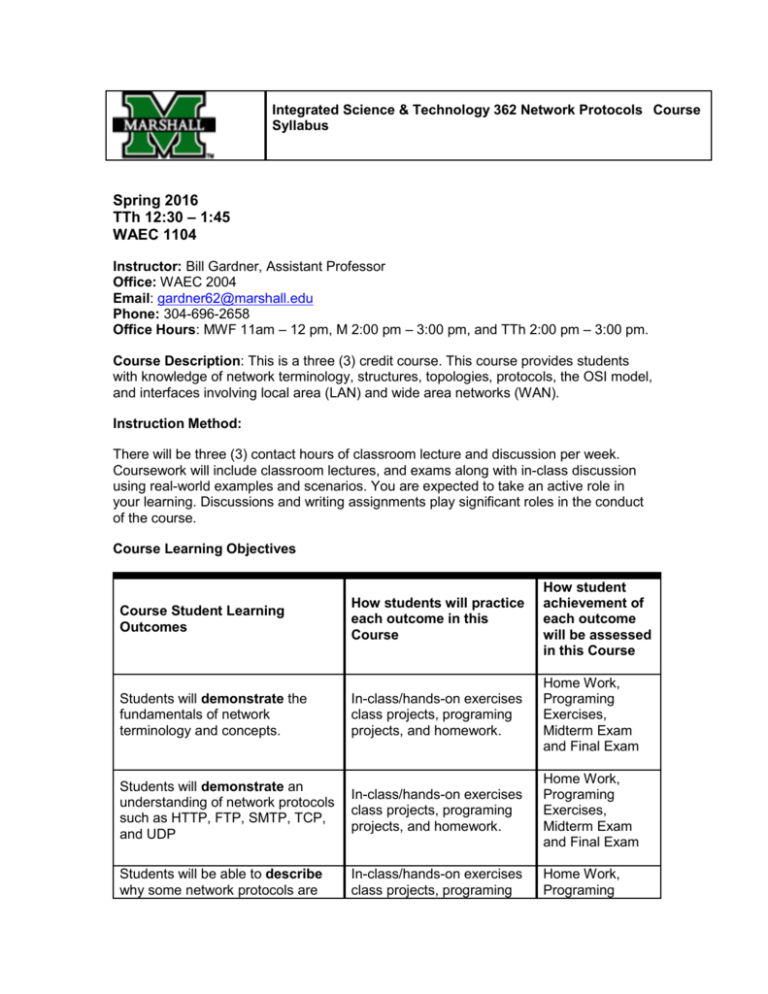
Integrated Science & Technology 362 Network Protocols Course Syllabus Spring 2016 TTh 12:30 – 1:45 WAEC 1104 Instructor: Bill Gardner, Assistant Professor Office: WAEC 2004 Email: gardner62@marshall.edu Phone: 304-696-2658 Office Hours: MWF 11am – 12 pm, M 2:00 pm – 3:00 pm, and TTh 2:00 pm – 3:00 pm. Course Description: This is a three (3) credit course. This course provides students with knowledge of network terminology, structures, topologies, protocols, the OSI model, and interfaces involving local area (LAN) and wide area networks (WAN). Instruction Method: There will be three (3) contact hours of classroom lecture and discussion per week. Coursework will include classroom lectures, and exams along with in-class discussion using real-world examples and scenarios. You are expected to take an active role in your learning. Discussions and writing assignments play significant roles in the conduct of the course. Course Learning Objectives Course Student Learning Outcomes How students will practice each outcome in this Course How student achievement of each outcome will be assessed in this Course Students will demonstrate the fundamentals of network terminology and concepts. In-class/hands-on exercises class projects, programing projects, and homework. Home Work, Programing Exercises, Midterm Exam and Final Exam Students will demonstrate an understanding of network protocols such as HTTP, FTP, SMTP, TCP, and UDP In-class/hands-on exercises class projects, programing projects, and homework. Home Work, Programing Exercises, Midterm Exam and Final Exam Students will be able to describe why some network protocols are In-class/hands-on exercises class projects, programing Home Work, Programing less secure than others. projects, and homework. Exercises, Midterm Exam and Final Exam Students will demonstrate use of Wireshark and other packet capture software to interpret and analyze network data. In-class/hands-on exercises class projects, programing projects, and homework Home Work, Programing Exercises, Midterm Exam and Final Exam Students will demonstrate the ability to understand the background and purpose of network applications. In-class/hands-on exercises class projects, programing projects, and homework Home Work, Programing Exercises, Midterm Exam and Final Exam Students will demonstrate an understanding of network topologies. In-class/hands-on exercises class projects, programing projects, and homework Home Work, Programing Exercises, Midterm Exam and Final Exam Required Textbook and Materials: Computer Networking: A TopDown Approach, 6/E. Kurose & Ross, Pearson (March 5, 2012). ISBN13:9780132856201 Topics and Methodologies: The following outline delineates the tentative class schedule with topics to be addressed during the course. Week/Reading Assignment Lecture Topics 1. Chapter 1 Introduction to the OSI model, History 2. Chapter 1 Packet Switching, Delay, Wireshark 3. Chapter 2 Application Layer, Web and HTTP 4. Chapter 2 Application Layer, FTP, DNS, SMTP/POP3/IMAP 5. Chapter 3 Transport Layer 6. No Reading Assignment Introduction to Python programing 7. Chapter 3 Transport Layer, MUX, UDP 8. Chapter 3 Transport Layer Socket/TCP/UDP 9.Chapter 3 Transport Layer, TCP 10. Chapter 4 Network Layer, Datagram, Router 11. Chapter 4 Network Layer, IP, DHCP, NAT, ICMP 12. Chapter 4 Network Layer, Routing, Broadcast, Mulicast 13. Chapter 5 Link Layer, Errors 14. Chapter 5 Link Layer, MAC, Addressing, Ethernet, Switches 15. Chapter 6 Securing Protocols 15. No Reading Assignment Final Exam Reading Assignments Students are expected to keep up with all reading assignments and come to class prepared to discuss the material. Exams: There are two exams: the Midterm and the Final. They cover all the course material to that particular point. Evaluation Method: Course grades will be based on a total points system. Your grade will be based on a percentage of the total points possible. Course Point Distribution Midterm Exam 100 pts Final Exam 100 pts Quizzes/In-Class Exercises/Homework/ Programing Assignments 200 pts Total Points Possible: 400 points Example: Midterm Exam 89 points Final Exam 87 points Quizzes/In-Class Exercises/Homework 168 points Total 344 points 344 divided by 400 = 0.86 In the example your grade would be 86% Grading Final letter grades will be based on the following scale: 90-100 A 80-89 B 70-79 C 60-69 D 0-59 F In the above example your final grade would be 86, which would be a B. Grading Policy: Instructor reserves the right to adjust these values based on the overall class performance. Attendance Policy: Attendance is required, and attendance will be taken in every class. One (1) point will be deducted from the total grade at the end of the semester for each class the student misses. Students who are more than 15 minutes late will be counted as absent for the entire class. Students who leave before class is dismissed with be counted absent. Students who are found sleeping or using computers to play games, surf social media, or for other activities not related to class content will be asked to leave and will be counted as absent. Make‐up exams will not be given except under unusual circumstances and satisfactory written justification. Any student who misses a quiz/assignment due to an unexcused absence will receive a grade of zero with no opportunity for make-up or substitution. Only University excused absences will be accepted. Make up quizzes/assignments must be taken within one week of the original scheduled date. The decision to allow a make-up quiz or accept late work rests with the instructor. Every student is responsible for all materials presented in class, including lectures, notes, and handouts. In case you are not present for a class, it is your responsibility to contact the instructor and receive information about the material presented in that class. Class attendance is very important. Academic Dishonesty Policy: Academic Dishonesty is defined as any act of a dishonorable nature which gives the student engaged in it an unfair advantage over others engaged in the same or similar course of study and which, if known to the classroom instructor in such course of study, would be prohibited. Academic Dishonesty will not be tolerated as these actions are fundamentally opposed to "assuring the integrity of the curriculum through the maintenance of rigorous standards and high expectations for student learning and performance" as described in Marshall University's Statement of Philosophy. In this course, STUDENTS ARE NOT TO “COPY & PASTE” MATERIAL FROM A SOURCE INTO ANY ASSIGNMENT UNLESS SPECIFICALLY AUTHORIZED BY THE INSTRUCTOR. If you are found cheating on projects or plagiarizing answers from the Internet or other sources (among other things), there will be no second chance. Your penalty is that you will receive a failing grade for the course. In those cases in which the offense is particularly flagrant or where there are other aggravating circumstances, additional, non-academic, sanctions may be pursued through the Office of Judicial Affairs. Notice of an act of academic dishonesty will be reported to the Department Chair, Dean of the College of Science, and to the Office of Academic Affairs. Please refer to the Marshall University Undergraduate Catalog for a full definition of academic dishonesty. Class Grade Appeals: Should you wish to appeal a grade, test question, etc, you MUST follow this procedure. You should send an email to me. The title of the email must read “GRADE APPEAL – Assignment Name” (i.e. Storage Quiz, Mid-Term, etc). The body of the email must include the question, question number, your answer, and why you think you deserve credit. For tests and quizzes in Blackboard, this should be done immediately after completion, before you leave class. You can copy and paste this information to make things simple. I will get back to you as soon as possible. Electronic Submission Format: File Names: All electronic submissions must follow this file naming convention: ist362_Last Name_First Initial_Assignment Name.doc Example: ist362_gardner_b_researchpaper.doc Communications Private E-mail will be used to make any general announcements, last minute changes, etc. It is mandatory that you monitor your email messages at least once a day. PLEASE ONLY USE MY MARSHALL EMAIL ADDRESS FOR CORRESPONDENCE: gardner62@marshall.edu. Messages left on Blackboard will result in a delayed response. Please read and follow the guidelines outlined in the “How to Email Your Professor” blog post: http://mleddy.blogspot.com/2005/01/how-to-e-mail-professor.html All students are responsible for knowing the University Computing Services’ Acceptable Use Policy available at http://www.marshall.edu/ucs/CS/accptuse.asp Cell Phones in the Classroom: Please set your cell phone ringer to "Vibrate Only" mode (or turn it off) before you enter the classroom. Computer Use in the Classroom: Please do not use the computers in the classroom to surf social networks or other non-course related sites. Professionalism: In this course you will be treated as professionals and will be expected to behave and perform as such. As professionals, you will be expected to attend class, be on time, complete all of your assignments, meet deadlines, ask questions when you don’t understand, and participate. Your classroom language and demeanor should also be professional. Disclaimer The instructor reserves that right to modify the course schedule and evaluation system should it become necessary for the effective conduct of the course. Policy for Students with Disabilities Marshall University is committed to equal opportunity in education for all students, including those with physical, learning and psychological disabilities. University policy states that it is the responsibility of students with disabilities to contact the Office of Disabled Student Services (DSS) in Prichard Hall 117, phone 304 696-2271 to provide documentation of their disability. Following this, the DSS Coordinator will send a letter to each of the student’s instructors outlining the academic accommodation he/she will need to ensure equality in classroom experiences, outside assignment, testing and grading. The instructor and student will meet to discuss how the accommodation(s) requested will be provided. For more information, please visit http://www.marshall.edu/disabled or contact Disabled Student Services Office at Prichard Hall 11, phone 304-696-2271. University Policies: By enrolling in this course, you agree to the University Policies listed below. Please read the full text of each policy be going to www.marshall.edu/academicaffairs and clicking on “Marshall University Policies.” Or, you can access the policies directly by going to http://www.marshall.edu/academicaffairs/?page_id=802 Academic Dishonesty/ Excused Absence Policy for Undergraduates/ Computing Services Acceptable Use/ Inclement Weather/ Dead Week/ Students with Disabilities/ Academic Forgiveness/ Academic Probation and Suspension/ Academic Rights and Responsibilities of Students/ Affirmative Action/ Sexual Harassment Dead Week (SR-90-91-(95) 247 ASCR) The last five class days of the fall and spring semesters shall be designated as DEAD WEEK for undergraduate students. Examinations that are designated as 15% or more of the final course grade may not be given during this period. Major papers and/or projects defined as 15% or more of the final course grade may be assigned during this period only if stipulated in the official course syllabus which is to be distributed at the beginning of the semester. Night classes, laboratories, freshmen English composition courses, and any classes meeting once a week shall be exempt from the requirements. New material and make-up examinations may be introduced or conducted during the DEAD WEEK.. Get Involved: There are tremendous opportunities to learn and network beyond your coursework. The student chapter of AIDE (Appalachian Institute of Digital Evidence), internships, networking with professionals, and research are just some of the possibilities. Opportunities for extra credit exist for students who get involved in learning activities including conference, student groups, etc. See me for details. IST Software Store The IST department maintains agreements with various software publishers to provide software for its computer labs as well as for its faculty, staff, and students. Students enrolled in IST department courses are eligible to receive a variety of software applications at no cost for use in their academic endeavors. This includes many of the same applications used in IST courses. You can find this information and more on the IST Web site at http://www.marshall.edu/isat/software/. Accessing the Store Students enrolled in this course will receive an email sent to their Marshall accounts containing information on accessing the store. Students will need to complete their account setup – which includes setting a password and agreeing to the included terms – in order to download the software. Once completed, students can use their individual accounts to “purchase” the applications. Purchasing an application will provide a license key and a link to download an installer. Social Networking: Follow me on: Facebook: https://www.facebook.com/oncee Twitter: @oncee Linkedin: www.linkedin.com/in/304blogs/ Other Twitter accounts to follow: Twitter:: @MUDigForensics and @AppyIDE Other websites of interest: Appalachian Institute of Digital Evidence - http://www.appyide.org Integrated Science and Technology - http://www.marshall.edu/ISAT/
